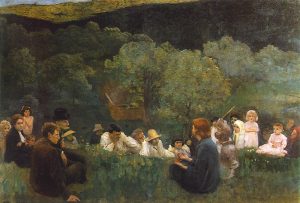Illuminations on the Lectionary readings for All Saints C, Nov. 2, 2025
(All Saints’ Day may always be observed on the Sunday following
November 1, in addition to its observance on the fixed date.)

Sermon on the Plain (1896), oil painting on canvas by Károly Ferenczy (1862-1917). Hungarian National Gallery, Budapest. (Click image to enlarge.)
First Reading: Daniel 7:1-3; 15-18
We remember all saints, known and unknown, on November 1, All Saints Day. In the Collect we pray, “Give us grace so to follow your blessed saints in all virtuous and godly living, that we may come to those ineffable joys that you have prepared for those who truly love you.” Our first reading is chosen from the Book of Daniel, one of the last books in the Hebrew Bible. Its apocalyptic style might remind us of Revelation; its contemporaries would have recognized its genre as metaphorical, not literal. In these verses, Daniel tells of a vivid dream about four alarming beasts that represent earthly kings, a terrifying vision that left his spirit troubled. But Daniel’s nightmare ends with reassurance as we recall all who have died and gone to their eternal rest: God will win and reign forever.
Psalm: Psalm 149
Shouting out praise for God’s glory, the Psalmist sings a new song with full heart and voice: A song that worships God so fully that the people physically embody their prayer in dance, music, and song. In these verses, we rejoice that God takes pleasure in us. We praise God who lifts up the poor. But then the short Psalm takes a sudden turn that might evoke an ancient vision of Judgement Day: It recognizes God not only as protector of the faithful but also as stern judge of all who’ve turned against God’s way.
Second Reading: Ephesians 1:11-23
Christ is King, and God has placed Christ at God’s right hand to rule over us all, the author of Ephesians assures his flock, a body of persecuted Christians of Asia Minor. From that time onward, the author assures them, all the people of God, baptized in Christ and sealed by the Spirit, are the saints of God. They all form Christ’s body on earth, pledged through our inheritance in baptism to redemption as God’s own people.
Gospel: Luke 6:20-31
As we listen to Luke’s version of the Beatitudes told in Jesus’s Sermon on the Plain, think about its differences from Matthew’s perhaps more familiar narrative in the Sermon on the Mount. Matthew shows Jesus guiding us toward service and neighborly love. While those goals are present in Luke’s telling as well, Luke’s version – as we might expect from the evangelist who told of Mary’s Magnificat and Jesus’s first sermon in Nazareth – focuses more directly on our duty to care for the poor and the oppressed. Luke tells not merely of Matthew’s “poor in spirit” but of all who actually have no money or resources. Luke calls us physically to give food to the hungry and water to the thirsty, in addition to standing with those who “hunger and thirst for righteousness.” Don’t just turn the other cheek, Luke demands: Forgive your enemies, and pray for them. In Luke’s Beatitudes, it may not be easy to do unto others, but it is essential. These acts bind us as the people of God.
